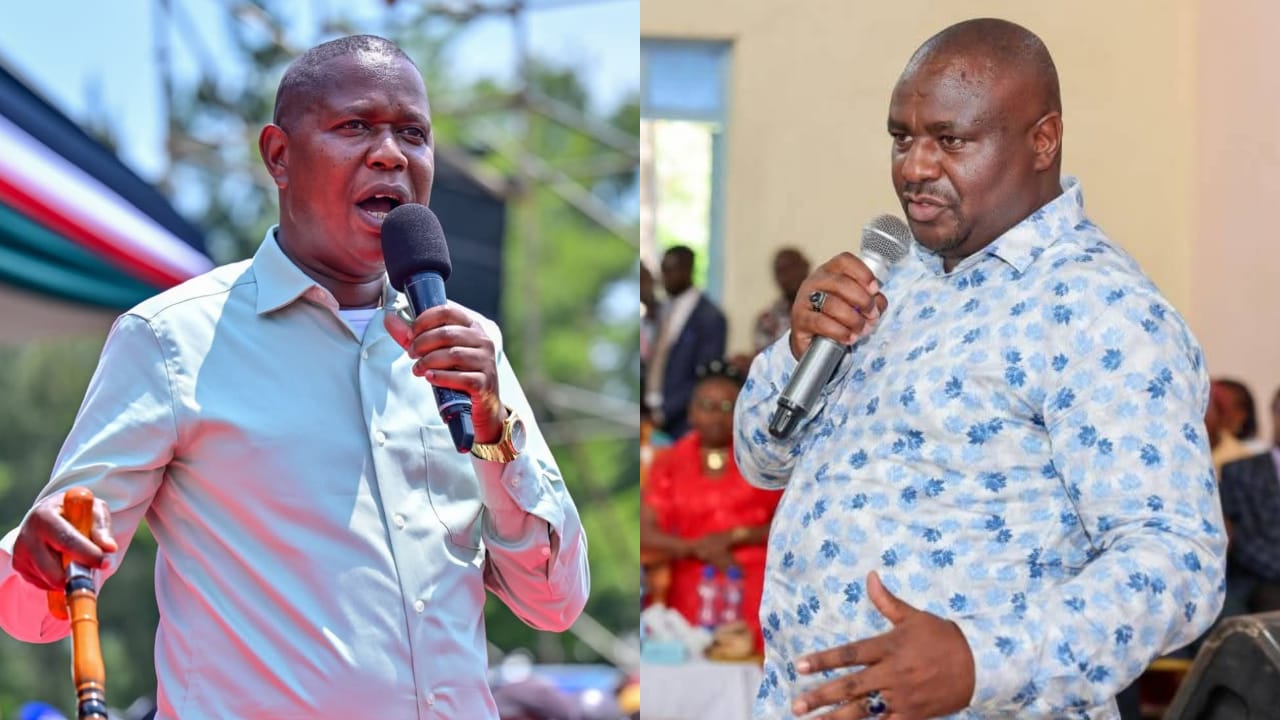 Kibwezi-West MP Mwengi Mutuse (left) and his Kilome Counterpart (Right). Photo Andrew Mbuva
Kibwezi-West MP Mwengi Mutuse (left) and his Kilome Counterpart (Right). Photo Andrew Mbuva
By Andrew Mbuva
A fiery exchange over education funding played out in public on Saturday as Kilome MP Eng. Thaddeus Nzambia and his Kibwezi West counterpart Mwengi Mutuse clashed on the government’s controversial decision to slash secondary school capitation from KSh 22,000 to KSh 16,000 per student.
Speaking during a ceremony to mark the retirement of Julius Mutwii, the long-serving principal of Mbeletu Secondary School, the two lawmakers aired sharply contrasting views on how to address the growing crisis in school funding—offering a glimpse into the heated national debate on education priorities.
Eng. Nzambia did not mince his words, taking a swipe at the government for what he termed “misplaced priorities,” accusing it of focusing on flashy projects like affordable housing while sidelining critical sectors such as education.
“We have a problem with this Government when it comes to capitation. And I want Mutuse to hear this loud and clear,” Nzambia began.
While maintaining a cordial tone towards Mutuse—whom he described as a personal friend—Nzambia challenged him to use his proximity to the President to relay a firm message.
“Tell the President he can play around with all other things, but not with school capitation. We are not ready to move from KSh 22,000 to KSh 16,000. In fact, we should be thinking of increasing it, not reducing it,” he said.
Nzambia argued that education must take precedence, asserting that an educated population would eventually finance its own housing and development.
“As MPs, we already struggle with bursaries that are not even enough. If the capitation is reduced, the burden falls squarely on parents,” he lamented, adding that school principals were suffering due to the chronic underfunding.
In a strong rebuttal, Mutuse acknowledged the capitation shortfall but cautioned fellow leaders against political grandstanding. He emphasized that the crisis has deep roots, dating back to previous administrations.
“As a country, free education is not a government favor—it is a constitutional obligation. But let’s also be honest. Schools have not been receiving full capitation since the days of former Education Minister Fred Matiang’i,” said Mutuse, who serves on the National Assembly’s Public Accounts Committee.
Mutuse said inflation and long-standing budget constraints have worsened the situation, noting that while former President Kibaki adhered to funding obligations, successive governments have struggled.
The Kibwezi West MP turned the spotlight on Parliament itself, asserting that MPs—particularly those on the Education Committee like Nzambia—should take responsibility for budget allocations.
“You sit in the Education Committee. Go back and raise the education budget to one trillion shillings. That is how we’ll get schools the money they need,” Mutuse said pointedly.
He called on lawmakers to match their rhetoric with action, reminding them that the budget process is a shared function between the Executive and Parliament.
“If MPs can refuse to pass the national budget without CDF money, then we must now also refuse to approve any budget that does not fully fund education,” he added.
In a bold proposal, Mutuse suggested that all bursary funds from MPs, MCAs, and governors be consolidated and redirected to the Ministry of Education to help bridge the funding gap.
“As MPs, it is not our core mandate to give bursaries. I’m willing to surrender the KSh 75 million I allocate in Kibwezi West. If we all do that, we can raise over KSh 400 billion annually, which will go a long way in making education free,” he declared.
He urged a bipartisan approach, insisting the capitation issue is not a government or opposition problem, but a national concern rooted in resource limitations and the need for efficient public spending.
“If you hear MPs refusing to let go of bursary funds, then know those are the enemies of free education,” Mutuse warned.
The clash comes just days after Treasury Cabinet Secretary John Mbadi admitted that the government is unable to sustain free secondary education under the current budgetary constraints.
The exchange between Nzambia and Mutuse underscores the growing rift within political ranks over how to prioritize funding in a strained economy.
As the education sector reels from years of underfunding, and schools accumulate pending bills, the public—and particularly parents—remain anxious about the future of their children's education.
Whether the bold proposals and fiery rhetoric translate into action on the floor of Parliament remains to be seen. But one thing is clear: the battle for education capitation is far from over.